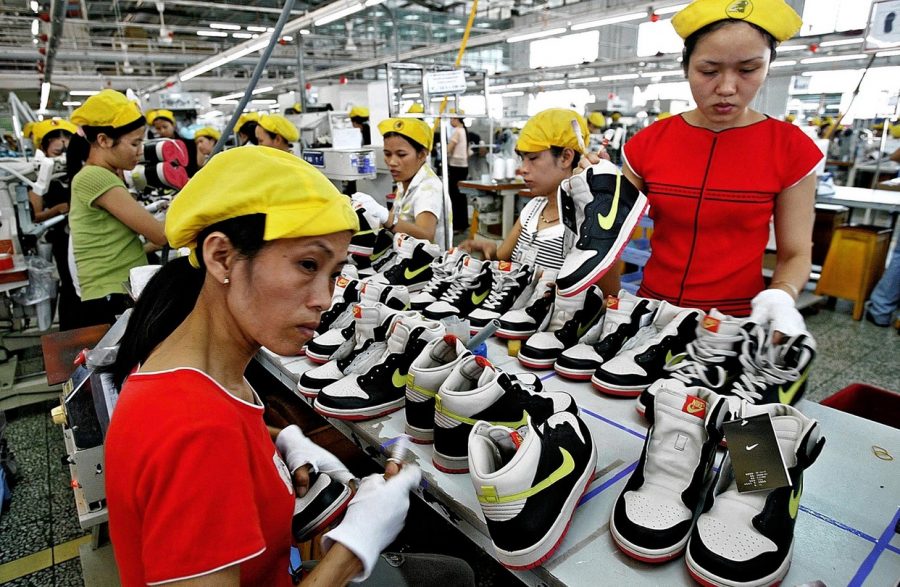Nike, a corporation fueled by a rise in globalism as well as its intrinsic intuition, has recently captivated the media by launching an ad campaign with Colin Kaepernick, the former quarterback for NFL team San Francisco 49ers now turned outspoken advocate for African American equality, especially in terms of treatment of police.
The ad, released on Sept. 4, was barred with the tagline, “Believe in something. Even if it means sacrificing everything,” followed by, “Just do it.” While this wasn’t the only segment of the ad, it was the one that drew the most controversy because of Kaepernick’s connection with kneeling for the National Anthem. The company defended themselves as well as further aligned themselves with Kaepernick’s ideals in a released statement: “Nike supports athletes and their right to freedom of expression on issues that are of great importance to our society.” Well, I’ve got a bone to pick with Nike, and it comes in terms of an issue that is of “great importance to our society,” and that is the equality and natural rights of a worker.
Nike uses an economic strategy called outsourcing that utilizes globalism to help maximize profit. In Nike’s case, they outsource to foreign countries with much more lenient labor laws than the United States, including Vietnam and China where it is cheaper for them to mass produce their clothing. So let’s look at the history.
In 1996, CBS News’s 48 Hours program investigated conditions at Nike factories in Vietnam, finding instances of corporal punishment of female workers and interviewing laborers who earned $40 per month for six days’ work per week (the equivalent of 20 cents per hour). According to a subsequent report by Dara O’Rourke , a researcher with the Transnational Resource and Action Center, the average wage of night shift workers at the Tae Kwang Vina factory in Vietnam was closer to 15 cents per hour, with workers performing 10.5 hours a day, six days a week — a total of 252 hours per month, with a monthly salary of $40.
Similarly in 2003, the World Bank reported that Nike violated Vietnam’s environmental and labor laws by exposing 10,000 workers (85 percent female) at the Tae Kwang Vina factory to toxic solvents and routinely forcing them to work above the legally-mandated overtime limit. Because of this, activist groups protested and even brought lawsuits against Nike for mistreatment of workers. In response, Nike established a code of conduct policy that allegedly instills U.S labor laws and also opens the door for educational opportunities.
Most may say that those two instances were over fifteen years ago and that they should not be cited as evidence against Nike now if they have, like they said, instilled U.S labor laws and a code of conduct. However, just as recently as 2016, Nike’s factory workers, predominantly women (80%), have not been offered the minimum wage of US citizens as well as the time off for maternity leave, as this is not a requirement by law in any of the previously listed countries.
Per The Clean Clothes Campaign, Vietnamese Nike factory workers, as of a 2016, make $0.61-$0.89 depending on the factory. This equates to 118 USD to 171 USD working a 48-hour work week. Along with this, the study reports that wage-theft (the illegal withholding of wages to influence workers) is also a common practice in factories despite it being against the currently instilled Nike code of conduct.
These three examples illustrate some of Nike’s sketchy behavior, and what they have to say about it doesn’t help ease the conscience:
“Nike expects that factory employees are timely paid at least the minimum wage required by country law… and an overtime premium aligned with local law, or 125 percent of the employee’s base hourly rate, whichever is higher, plus legally mandated benefits, including holidays and leaves, and statutory severance when employment ends… Suppliers shall not require workers to work more than the regular and overtime hours allowed by the law of the country where the workers are employed. The regular work week shall not exceed 48 hours. Suppliers shall allow workers at least 24 consecutive hours of rest in every seven-day period. All overtime work shall be consensual. Suppliers shall not request overtime on a regular basis and shall compensate all overtime work at a premium rate. Other than in extraordinary circumstances, the sum of regular and overtime hours in a week shall not exceed 60 hours.”
Essentially, this cites that Nike complies with country law, hence why they’re outsourcing, and mandates that there’s a cap at 60 hours a week; however, it can be broken, which basically makes that part of the statement useless. While Nike takes a step in the right direction by stating, “All overtime should be consensual,” they obviously have not gone far enough to push the initiative that it is against Nike’s code of conduct to withhold the wages of workers as it is still being done in Malaysia this year. See ABC News for whole story.
I find it extremely difficult to say Nike is trying its hardest to solve “issues of great importance” that do not push a narrative for themselves. Time and time again, Nike has allowed for injustice to be done within its own corporation in favor of profits. While I can admit I’m a cynic, the evidence I have gathered does not give me any hope that Nike will change its ways. This selfish ideology will continue to happen unless Nike faces extreme reprimands or protest which cause them to lose massive profits. But for now, their stock keeps rising as Nike’s social hypocrisy stays in the dark.






